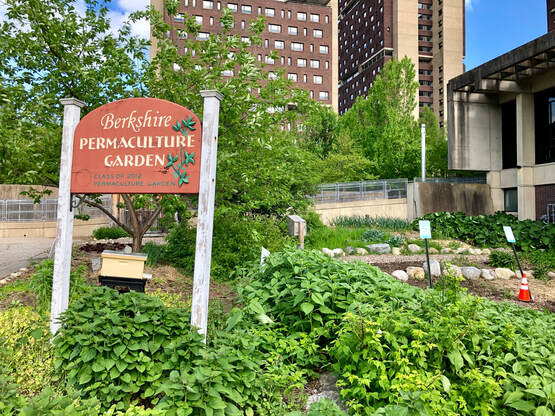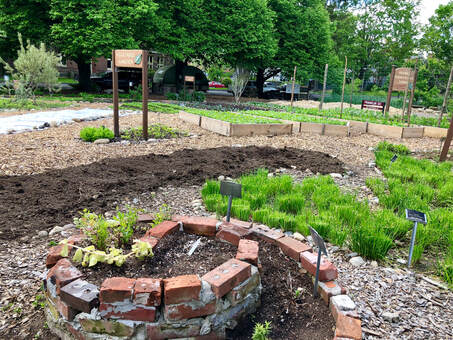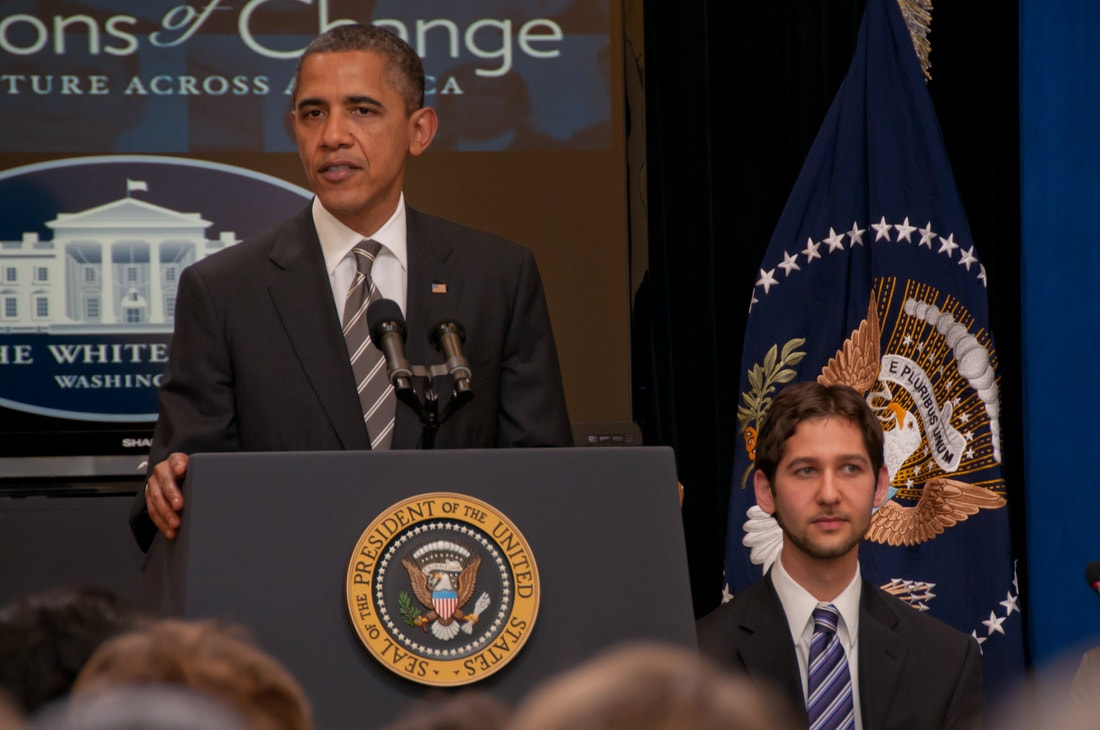University of Massachusetts Permaculture Gardens

Walking around Amherst, MA, on the University of Massachusetts (UMASS) Campus, I am energized by the commitment unfolding in regenerative design. The campus houses five different permaculture gardens, with one located as a functional, edible showpiece at Chancellor’s house. Dining Services funds the gardens and campus chefs engage in the Real Food Challenge cooking with permaculture garden produce, often winning top awards nationally for the culinary quality. In 2012, the UMASS permaculture team won the national Campus Champions of Change Award. Fourteen students, the Sustainability Coordinator for Campus, the Chancellor, Vice Chancellor for Administration and Finance, and the executive director for Auxiliary Services proudly represented permaculture at the White House with president Obama. According to a UMASS press release, “the president told students that while federal policy is important, ‘ultimately good government policy will only go so far.’ What's needed, he said, is the commitment of individuals to be social entrepreneurs and improve their communities. The group assembled, he said, represents the ability to make a difference.”
Regarding the initiative purpose and impact, the main UMASS permaculture webpage states the following:
A unique and cutting-edge sustainability program, UMass Permaculture provides empowering hands-on education and leadership training, community engagement, and fresh, local, organic produce to the UMass campus. Founded in 2010, the initiative builds and maintains highly productive, highly educational edible gardens right on campus. The gardens are designed using permaculture principles and are installed by students, staff, and volunteers.
UMass Permaculture serves as an international model, which has inspired permaculture projects at campuses across the world. It has received global recognition and numerous accolades, quickly becoming the most widely recognized campus permaculture initiative in the country…We are now in our 9th growing season and our gardens continue to be innovative, regenerative landscapes. Through the restoration of natural ecosystem processes we continue to sequester several tons carbon and capture thousands of gallons of storm water runoff annually. In 2018, our ½ acre of gardens yielded 1,739 lbs. of produce, an estimated value of over $9,000.
I sat at one of the campus permaculture gardens just outside of dining services with Daniel (Dan) Bensonoff, Sustainability Coordinator of Campus Gardens. Dan manages all five campus gardens and although his excitement for the amount of nutritious produce feeding into Dining Services is evident, he is most excited about how the gardens have created gathering spaces for people to slow down and reconnect with their senses and memories. “Our culture is changing so fast that we need time to slow down. We need time to re-evaluate our decisions in life. And I’m hoping that this space can be a part of that work.”
 Dan discovered permaculture during an apprenticeship at an Eco Village in Israel after studying English in college. He received his PDC in Israel and learned a range of important topics from natural building to herbalism. In returning to the U.S., Dan was excited to apply what he had learned in Israel to the social structure here. After a few years of working on various for- and non-profit farms, however, the issues in the U.S. farming system structure caused Dan to question whether it was the right career to pursue, economically, physically and psychologically. He began teaching High School English, culinary arts, and gardening, and immersing himself more into his community in Boston by guerilla gardening. “We would take vacant lots and transition them to community spaces where anyone could come in and harvest” – playing around with the commons – to see what communities might come together through shared sights across differences.”
Dan discovered permaculture during an apprenticeship at an Eco Village in Israel after studying English in college. He received his PDC in Israel and learned a range of important topics from natural building to herbalism. In returning to the U.S., Dan was excited to apply what he had learned in Israel to the social structure here. After a few years of working on various for- and non-profit farms, however, the issues in the U.S. farming system structure caused Dan to question whether it was the right career to pursue, economically, physically and psychologically. He began teaching High School English, culinary arts, and gardening, and immersing himself more into his community in Boston by guerilla gardening. “We would take vacant lots and transition them to community spaces where anyone could come in and harvest” – playing around with the commons – to see what communities might come together through shared sights across differences.”
When he discovered his current position at UMASS, Dan found a career that brought together all he wanted to do: teach, garden, and empower others. During the fall and spring semesters, he teaches a one credit permaculture practicum course to 20 students per semester. In the summer, he oversees a garden crew of seven students, 85-100 volunteers, and several tour groups. Teaching permaculture at the university, Dan sees the magic unfold in empowering students. When walking away from his classes, his hope is that they begin to see “…themselves as doers. As people who are able to really take care of themselves and their family and their friends in real ways - whether that’s through emotional support, physical support, making something for them, helping heal them, helping them grow food – whatever it is. We live in a very passive culture where we sit in classrooms or behind TV screens, computer screens. I think students are incredibly excited whenever we do any kind of hands-on project because they want to make, they want to be creative, they want to have an impact. And that’s the part that speaks to them and that spoke to me when I was young as well…I think that there’s a real thirst for not just minimizing impact but really having a positive impact…and that to me is really where permaculture can offer a strong narrative and some techniques as well.”
When people stop by the garden, Dan’s definition of permaculture varies depending on the interest and experience of the questioning individual. By and large, however, he defines permaculture as “a lens for any kind of systems design that tries to bridge ecological and human function.” In reflecting on the major benefits of permaculture, Dan loves how it is open source, the principles are broad enough to apply to any discipline, it reconnects people with their senses, and that it allows for a resurgence in gratitude to the systems allowing permaculture to prosper before it was coined as such; namely the many indigenous and modern contributions to the design framework.
Although his work focuses largely on landscaping, “I think that there’s a real recognition that we need to be really focused on social structures and really redesigning social and economic structures as much so as physical landscapes. Physical landscapes are the gateway. They were for me and that’s still the part I’m most passionate about and I think that for a lot of other permaculturalists that was the gateway and then they perhaps moved on to other projects that were more about how do we bring people together and redefine what it means to share space, to support each other, to create new economic incentives, to create new familial models, new communities – all of those things…rethinking social and economic norms...to really think about longevity, you need to first think about what kind of culture can create longevity.”
Little by little, Dan is helping students rethink their role in our culture and their potential to make a difference. From presidential recognition in Washington D.C. to national culinary awards, the physical gardens at UMASS may indeed simply be a gateway – a gateway to inspiration, change, hope and regeneration of our natural, social, and cultural systems.
To discover more about Dan and the UMASS permaculture initiative, visit: https://www.localumass.com/permaculture.html

Recent Posts

